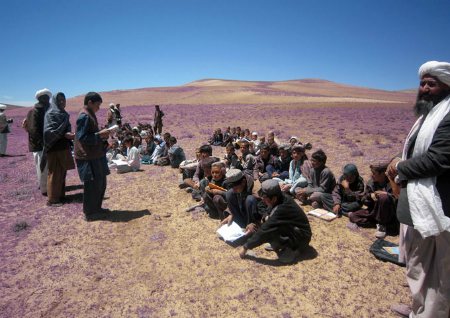By Mohammad Halim Karimi
Various unwanted factors have led to the closure of more than 80 percent of female schools in western Ghor province, it is learnt.
Ghor is home to some 8000 registered schools, including 190 schools for girls. More than 125, 000 boys and 83, 000 girls study in these schools.
The provincial chapter of Independent Human Rights Commission (AIHRC) has expressed its grave concerns over the closure of so many schools in Ghor.
Jawad Razai, AIHRC head for Ghor, told Pajhwok Afghan News schools closed during the past three years were in Pasaband, Taywara, Shahrak, Du Layna, Chaharsada and Tulak districts, with girls facing serious troubles to seek knowledge.

Many classes, such as this one in Doliana district, Ghor province are held in the open air. (Obaid Ali/Al Jazeera)
Razai said denying girls their right to education was gross human rights violation. He said the number of girls attending school in Dawlatyar and Lal Wa Sarjangal districts was satisfactory, though some girls’ schools there were not operational in real but on paper for pay and privileges.
“All funds released in the name of closed schools either end up in the hands of education department officials or armed rebels,” Razai noted.
He further said corruption and mismanagement at the provincial education department, the existence of illegal militias, armed rebels, warlords and anti-literacy culture were among major factors behind the closure of schools in Ghor.
Maryam, a 10th grade girl student in Chaharsada district said their school had been closed for the past two years. Recently armed rebels threatened locals not to send their daughters to school, she added.
Another student, Shah Gul, an 8 grader, said she studied at a school in Band-e-Amir area, 20 kilometers from the provincial capital till grade 6. “It has been two years the said school has been closed. I wish to learn and become a teacher but there is no one to teach me” she regretted.
A resident of Murgha area, Mohammad Salim, said besides girls’ schools, most schools for boys were also closed due to Taliban threats and insecurity in their area.
Ghor Women’s Affairs Department head Masoma Noori said girls’ schools remained shut over the past three years, depriving thousands of girls from education.
She said salaries of female teachers were received by some specific individuals. “Widespread corruption, pocketing teachers’ salaries, contract-based appointments and poor management in addition to the presence of illegal armed groups can be blamed for all these irregularities. The education department receives wrong information that girls’ schools are open in order to obtain their salaries,” Masoma said.
But Education Director Sibghatullah Akbari rejected the claims that most girls schools had been shut, saying such schools were operational even in areas out of government control.
He said only a fewer number of schools in unstable districts including Pasaband and Chaharsada were sometimes closed due to insecurity.
Akbari also rejected the Women’s Affairs Department’s and the human rights commission’s claims about the closure of schools, saying the two organisations were not responsible to comment about something none of one’s business.
The Education Department had previously said insecurity and the existence of illegal armed men were main obstacles to the education process as a number of schools in Dolina and Dawlatyar districts and some remote areas had been closed as a result of violence.
Ghor is one among provinces where people do not allow their daughters to get education outside their homes.
Abdul Samad, a dweller of Quts village in Firozkoh, the provincial capital, said, “My daughter has attended school up to grade sixth but learnt nothing.”
He added there was no female teacher in her school and he advised his daughter to stop going to school when she grown up.
However, a number of schools remain closed and being used as security posts.
Islamuddin, a resident of Pasaband district, said the girls’ school in their area was closed five years ago. The single building high school for girls in the district centre has been converted into a military base.
Injila Sharifi, a provincial council member, said teachers of closed schools continued to receive their salaries.
Governor Sayed Anwar Rahmati admitted the closure of some schools and said these schools could not be opened due to the presence of rebels and illegal armed men and their parallel governments.
He said militants in the name of Taliban did not allow girl education in areas under their control.
Rahmati said lack of security personnel and the prolonged electoral crisis gave militants space to spread their activities in many provinces, including Ghor.
He hoped the new government would explore ways how to improve security and ultimately resolve issues concerning education, economy and other sectors.
Meanwhile, Ghor police chief Brig. Gen. Ahmad Fahim Qaim said security personnel shortage led to increased insecurity in some areas, where schools were shut down.
He added police and other security forces had been engaged providing security for the elections for the past one year, allowing militants to occupy some areas in various districts.
He said police always backed the education sector and the education department should also show some courage by involving ulema and others influential figures in efforts at reopening closed schools.
Local officials say 130 different groups consisting 6,500 rebels are present in Ghor and out them 3,500 are Taliban fighters.



